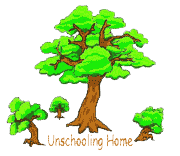When Humor Isn't Funny
Below are examples of child-belittling humor, and I ask any who read this to consider the importance of objecting to humor that harms any class of people. Hateful racist humor is no longer accepted. Humor about "girls" (women) that makes them seem dippy and weak is going out of style. Are children the last frontier? (Children and Aggies?
Yes, jokes are funny, and yes, people need to have a sense of humor, but people also should have a sense of their own beliefs and courage and the future of mankind. Is that overstating it? Maybe and maybe not.
Because if Isaac had been a teenager it wouldn't have been a sacrifice.
Recently on the phone a relative in Florida, originally from Kentucky,
jokingly said to me "I hope you're keeping the kids in line with their
needed spankings." I don't think they really expected an answer or
even thought that we do that (I don't know) but I was so surprised to
hear such a bad joke.
It seems that would mean they think it's acceptable to most people, wouldn't it?
Where and in what circumstances are children most openly spanked? In my experience, sadly, church and at family gatherings of extended spanking families.
When I was really little, in Texas, in the 50's, Rastus and Liza jokes were common. They were along the lines of two-character moron jokes. The effect, though, was to create prejudice and an image of African Americans as, well, morons. I moved to Northern New Mexico, a WHOLE different culture, and never heard another one.
In the late 60's and early 70's, anti-female jokes were common. Nasty jokes about rape and about stupidity. Not like blonde jokes, but worse. The women's movement made people less likely to tell or laugh at those jokes. It empowered women to say "That's not funny," and "That attitude is sexist and ignorant."
The next wave to which people rarely object is anti-child humor.
I'm not saying that none of those jokes are funny. One can't help laughing sometimes at a surprising ending or a ridiculous situation, and the laughing itself can be forgiven, but I do think if there is to be cultural change, it's worth pointing out to our friends, our parents, our children, that humor that undermines a class of people, and humor to which others are afraid to object (or to which they never considered objecting) perpetuates problems we could benefit from dumping.
I was on someone's humor list, and once received a set of anti-child jokes that really offended me. I responded to the list and said something along the lines of what's above (but very short version), and got three hateful e-mails and lost my friendship. The people on that list were almost all teachers in the public schools, in Salt Lake City. Some of them I know to be childless. I liked that friendship a great deal at one time, but I like my children's future and my integrity much more.
And maybe it's just a problem with the image of children in this culture.
I think it's like hazing. Whatever psychology makes fraternities, military training facilities, high school football teams, etc., WANT to torment the new recruits is what makes adults torment children. They were tormented and their solace was that someday they would be the tormentors. How does it stop? People die. Football players and fraternity members and recruits die. And children die when parents believe that they have the right to "discipline" them or torment them, and when they think that other adults around them will not object. Even when they don't die physically, they can die emotionally. Their will to live, and their self esteem, and their potential for joy and trust might never recover.
The U.S. has not and will not ratify the United Nation's Right of the Child resolution.
This isn't new stuff.
Standing up against racist jokes, jokes about women or men, jokes about
spanking or how awful children are, is never easy, but I believe they
are important stands to make. Using humor to dismiss the very real
denigrating and abusive attitudes behind the jokes too often slides by,
uncalled. Good for you! I, for one, applaud your efforts whether they
are well-received or not.
I guess the analogy wouldn't bug me so much if the author wasn't so obviously playing into the biases that society holds against children. yuck.
I'm not some humorless blob. I get Blonde jokes sent to me occasionally, yeah, they're funny (if untrue). I tend to like analogies that are goofy....but I didn't like this one. I don't like my children being compared to some loyal, slobbering dog I suppose.:)
They're intelligent, capable human beings who like me because I like them.
Ren
In an unschooling discussion, someone wrote this, and the comment below is mine (Sandra): "What I seem to have seen is that any disrespect of children, woman or minorities is more open for whatever reasons in the south compared to the north."
Posted to a Destination Imagination list, to a group of people who are dealing supportively with really bright kids, 2005:
Why did God ask Abraham to sacrifice Isaac when Isaac was 12 years
old?
 On a New Mexico list for homeschoolers I created and maintained for years, someone put up a quote from e-Bay (- great source of quotes- :-/) that said raising a teenager was like nailing jello to a tree. I objected to it, lightly, said I wasn't having problems with my unschooled teens, and was hooted down by some people insulting me and unschooling. The upshot was I gave the list to someone with thicker skin and newer energy, and I quit the whole list. If on a homeschooling list it's to be fine to insult those whole people to whom we have supposedly dedicated our lives, there are problems with homeschoolers.
On a New Mexico list for homeschoolers I created and maintained for years, someone put up a quote from e-Bay (- great source of quotes- :-/) that said raising a teenager was like nailing jello to a tree. I objected to it, lightly, said I wasn't having problems with my unschooled teens, and was hooted down by some people insulting me and unschooling. The upshot was I gave the list to someone with thicker skin and newer energy, and I quit the whole list. If on a homeschooling list it's to be fine to insult those whole people to whom we have supposedly dedicated our lives, there are problems with homeschoolers.
The first version of that (as far as I know) was 1924.
There was another in 1959.
The one that all member nations were asked to sign off on was 1989.
Here's something I found, and here's a quote from that. Not the same, but same principles, and the U.S. has not signed the binding treaty. Last I knew, two nations had not signed. This document is a non-binding resolution of the United Nations General Assembly. It should not be confused with the
International Convention on the Rights of the Child which was adopted by the UN General Assembly on the thirtieth anniversary of this document, 20 November 1989. That document is a binding treaty to which 176 nations have become "states parties".]
You can probably guess which element of U.S. political culture I have heard/read complain most bitterly about that resolution violating THEIR rights.
Robyn Coburn wrote:
I am sitting here, having to breathe deeply – CHOOSING to breathe
deeply – to get over the roiling pit of fear in my belly because I
have publicly challenged the owner of one of our local h/s groups
about a supposedly funny story she posted about a mother spanking her
two year old for singing out of turn in church, singing a hymn no
less. I just don’t think spanking is something to laugh about. She
wrote back minimizing the spanking as “a symbolic swat, nothing to
call CPS about”; I responded with “Do we wait until swats become
something to call CPS about before we stop laughing?” and a whole lot
of links.
Danielle Conger responded:
Oooooh, good one! That was an excellent response, imnsho.
[In 2003, after some discussion in which there had been some negative comments about anti-child humor, someone had written "Lighten up, ya'll!" and Ren responded:]
I think it would be easier to lighten up if children weren't already the brunt of so much disrespect. I'm a bit full up on jokes that involve children...even analogies that are basically harmless. My hackles raise when I hear "training" in relationship to raising children. So far, my teen has not turned into a "cat" and I think how you treat children has a lot to do with how much they pull away from you and the way they display their independence.
Spanking jokes, in the first half (or more) of the 20th century, helped prevent people from looking at spanking, and probably helped them slough off residual emotional thoughts about having been spanked. If everybody did it, then it couldn't be so bad. Other parenting considerations
Other parenting considerations  Spanking
Spanking
 Unschooling
Unschooling
